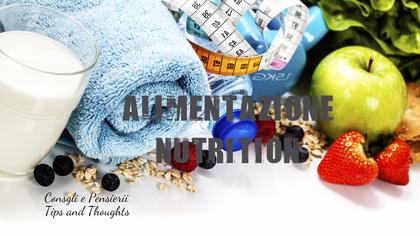Official Sponsors

07.09.2024

| News date | 27.12.2016 |
May the nutrition affect the sport performance? What should we eat before, during and after the sport activity? The physician Caterina Russolo answers these questions. She is nutrition biologist but also fitness teacher and fond of sport.

An important precondition for a balanced nutrition is the energy input, that should be correctly calculated and must therefore take into account the daily energy expenditure. This factor is formed by the metabolic rate for the 60-75%, by the thermogenesis for the 10% and by the sport activity for also the 30%. The metabolic rate is influenced by individual factors, like body composition, age and gender. For example, the more is the muscular mass of the persons, the greater will be the energetic expenditure. A man of 70 kg can burn 840 Kcal in only 1 hour of cross-country skiing with a medium intensity. Between an active and a sedentary person there are important differences about the energy input. A too low caloric intake could cause weight loss, more fatigue, an increased risk of trauma, a longer recovery and for women it could cause even abnormal periods and a decrease of the bone density.
The sport nutrition should support the athlete either in terms of quantity and quality, giving the right macro and micro nutrients to practice sport.
All the energetic substrates (protein, carbohydrate, fat) through the Krebs cycle, contribute to the ATP production, which is the cellular energy. But it is necessary to consume them in the right proportions.
The Protein represents 15% of the daily calories. In the endurance sports, proteins have not a fundamental role for the release of energy, so they are dosed in base on the necessity to rebuild the muscular fibers broken during the training or the race, avoiding the post workout muscular pain. It is recommended to divide the daily protein during five meals (breakfast, morning snack, lunch, afternoon snack, dinner) and not only in one of them.
The fats are a very important energetic source that help to absorb the fat-soluble protein and to regularize the cell membranes. The uptake of lipid shall not exceed the 30% of the total calories; you should limit the saturates and prefer short-chain acids that are a good fuel for the muscles for endurance disciplines.
The carbohydrate should be at least 50% of the daily intake of calories but, in the endurance sports like long distance xc skiing, can increase to 65-70%, especially in the days before the competition. They represent the main energy source. In sport activities longer than 60 minutes, they allow to maintain higher levels of performance. The lack of carbohydrates during the activity leads to a fall in performance. The production ex-novo of muscle glycogen take a time of 20-22 hours. How are we supposed to compensate this lack in case of close training sessions or races?
The meals TIMING and the choose of the carbohydrates based on their glycemic index, can safeguard and quickly restore the muscle glycogen and positively influence the sport performance.
What is the GLYCEMIC INDEX?
This represents the ability of a nutrient to cause an increase in blood sugar such as to bring to an insulin response that leads to the transport of glucose into cells. Depending on the time when an athlete assumes carbohydrate aliments, a particular food based on its glycemic index should be chosen.
Is a good habit for any athlete to divide five meals during the day, taking care in particular to the meals pre and post workout/race. A balanced nutrition also during the training and recovery periods is very important to have then an optimal base for the competition performance.
PRE-RACE NUTRITION
The pre-race nutrition depends on the characteristic of the competition, especially on its duration. During a running marathon, a cycling Granfondo or a long distance xc skiing race the right nutrition aims at increasing the muscular and hepatic glycogen and the glucose, taking care of the digestive capacity (with the limitation of fibers and proteins) and promoting the carbohydrates with a lower glycemic index. You should eat at least three hours before the activity: when we are resting, the blood flows in the muscles for the 20-25%, while during an activity this percentage increases to 80%. If you eat just before the training or the race, a part of the blood necessary for the muscles will be dedicated to the digestion process.
Just before the race you can take carbs, so that you have energy enough for the whole performance. The energetic drink with maltodextrins is the ideal beverage.
Hydration is part of the preparation for the race: the advice is to drink about 500 ml of water two hours before the race. Then continue during the performance, if possible, with a quantity of 150-300 ml every twenty minutes.
DURING THE RACE NUTRITION
As already mentioned (read the supplement during the training or the race), it is important to take a mix of carbohydrates with different absorption rate: this could prevent hypoglycemia and have enough energy for the whole performance. Usually beverages are more digestible than solid food and improve the hydration. In fact during the activity we can lose half liter of water every hour: a decrease of 2% of the body weight causes a decrease of 20% of the sport performance.
POST RACE NUTRITION
After the race we must restore quickly the muscular glycogen. It is important to eat within 30 minutes after the end of the activity food like white bread, biscuits, pie and drinks like fruit-juice. It is recommended to eat carbohydrates every two hours in the six hour following. You can combine a part of protein that is useful for the reconstruction of the muscular fibers, while fruits and vegetables rich of omega-3 and omega-6 combats the free radicals created during the sport activity.
All this confirms the central role of carbohydrates in athletes’ nutrition, whether they are simple or complex sugars. The important thing is to understand when and how they should be consumed.
A good nutrition is not a condition that can turn athletes into champions but, if an athlete or a champion eat wrong, their performance can get worse. In many disciplines a hundredth of a second makes the difference between a gold or a silver medal, so it is necessary to be in perfect physical, mental and nutritional condition: the better performance depends on a combination of training, recovery and balanced nutrition.
READ ALSO
MARCIALONGA SKIING: HOW TO PLAN THE BEST TRAINING
XC SKIS WITH SKINS: DO THEY REALLY ALLOW GOOD PERFORMANCES?
THE IMPORTANCE OF THE MUSCULAR STRENGHT FOR THE XC SKIING AND FOR THE WELLNESS
THE SUPPLEMENT DURING THE TRAINING OR THE RACE
WHAT SHOULD CONTAIN A WAX BOX?
PILATES, AN EXCELLENT TRAINING FOR XC SKIING
THE SECRETS FOR PREPARING FOR A LONG DISTANCE RACE
THE MOTIVATION IN THE ENDURANCE SPORTS
ANTONELLA CONFORTOLA: EXPERIENCE AND ADVICE ON MARCIALONGA
Title sponsors

Main Sponsors




Official Sponsors

Sustainable Partner

Official Suppliers













Official TV Broadcaster

Institutional Partners

Friends

